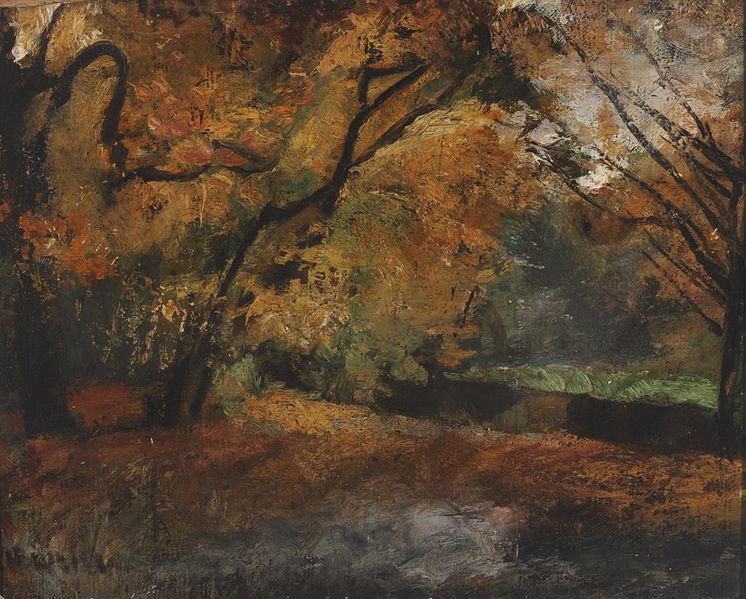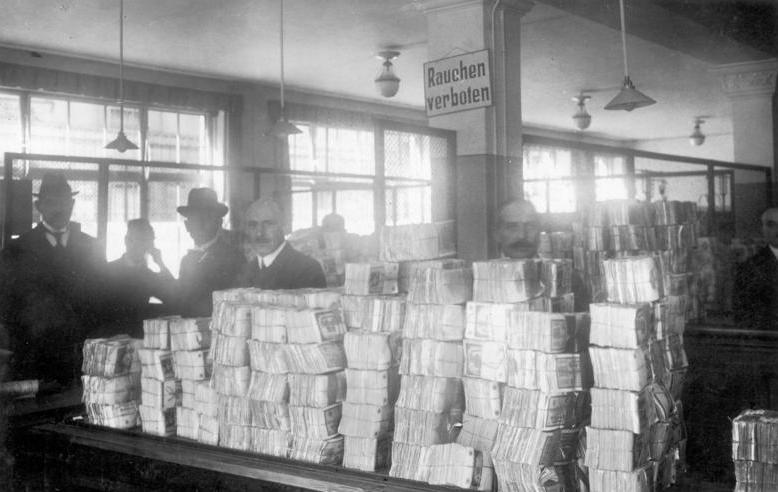|
Hedwig Weiß
Hedwig Weiß (25 May 1860, Königsberg - 1923, Berlin) was a German painter and graphic artist. Her works are primarily Impressionistic in style. Biography Her father, Bernhard Weiß, was an Evangelical theologian. Her mother, Hermine (née Von Woyna) was a member of the nobility. They supported her interest in the visual arts as a pastime, but not as a profession. She and her friend, Käthe Kollwitz, received lessons in drawing and engraving from Rudolph Mauer (1845-1905). Later, she attended the in Berlin where she studied with Karl Stauffer-Bern and met her lifelong friend, Maria Slavona. In 1887, she completed her studies in Munich with Ludwig von Herterich, and Fritz von Uhde, who had a significant influence on her style. After 1888, she shared a studio in Berlin with Olga Boznańska and became a member of the Verein der Berliner Künstlerinnen. She participated in their exhibitions and eventually joined their governing board. She also presented her works at the second e ... [...More Info...] [...Related Items...] OR: [Wikipedia] [Google] [Baidu] |
Hans Vollmer
Hans Vollmer (16 November 1878 – 15 February 1969) was a German art historian. Life His father was the architect (1845-1920), his grandfather of the Hamburg marine painter and sculptor Adolph Friedrich Vollmer (1806–1875). He was the older brother of the painter and sculptor Erwin Vollmer (1884–1973). Vollmer studied art history, history of sciences and philosophy in Berlin and Munich. In 1906 he was awarded a doctorate by Heinrich Wölfflin in Berlin with a thesis on ''Schwäbische Monumentalbrunnen von der Gotik bis zum Klassizismus'' (Swabian monumental fountains from the Gothic to the Classicism). Since April 1, 1907 he was employed in the editorial office of the '' Thieme-Becker ''Allgemeiner Künstlerlexikon'' at the publishing house E. A. Seemann in Leipzig, in 1923 he took over the editorial management and became editor of the Thieme-Becker company. He worked as the main contributor, supported by a small editorial staff, until the completion of the 37-volume wo ... [...More Info...] [...Related Items...] OR: [Wikipedia] [Google] [Baidu] |
Artists From Königsberg
An artist is a person engaged in an activity related to creating art, practicing the arts, or demonstrating an art. The common usage in both everyday speech and academic discourse refers to a practitioner in the visual arts only. However, the term is also often used in the entertainment business, especially in a business context, for musicians and other performers (although less often for actors). "Artiste" (French for artist) is a variant used in English in this context, but this use has become rare. Use of the term "artist" to describe writers is valid, but less common, and mostly restricted to contexts like used in criticism. Dictionary definitions The ''Oxford English Dictionary'' defines the older broad meanings of the term "artist": * A learned person or Master of Arts. * One who pursues a practical science, traditionally medicine, astrology, alchemy, chemistry. * A follower of a pursuit in which skill comes by study or practice. * A follower of a manual art, such as a m ... [...More Info...] [...Related Items...] OR: [Wikipedia] [Google] [Baidu] |
German Women Artists
German(s) may refer to: * Germany (of or related to) **Germania (historical use) * Germans, citizens of Germany, people of German ancestry, or native speakers of the German language ** For citizens of Germany, see also German nationality law **Germanic peoples (Roman times) * German language **any of the Germanic languages * German cuisine, traditional foods of Germany People * German (given name) * German (surname) * Germán, a Spanish name Places * German (parish), Isle of Man * German, Albania, or Gërmej * German, Bulgaria * German, Iran * German, North Macedonia * German, New York, U.S. * Agios Germanos, Greece Other uses * German (mythology), a South Slavic mythological being * Germans (band), a Canadian rock band * "German" (song), a 2019 song by No Money Enterprise * ''The German'', a 2008 short film * "The Germans", an episode of ''Fawlty Towers'' * ''The German'', a nickname for Congolese rebel André Kisase Ngandu See also * Germanic (other) * Germa ... [...More Info...] [...Related Items...] OR: [Wikipedia] [Google] [Baidu] |
German Engravers
German(s) may refer to: * Germany (of or related to) **Germania (historical use) * Germans, citizens of Germany, people of German ancestry, or native speakers of the German language ** For citizens of Germany, see also German nationality law **Germanic peoples (Roman times) * German language **any of the Germanic languages * German cuisine, traditional foods of Germany People * German (given name) * German (surname) * Germán, a Spanish name Places * German (parish), Isle of Man * German, Albania, or Gërmej * German, Bulgaria * German, Iran * German, North Macedonia * German, New York, U.S. * Agios Germanos, Greece Other uses * German (mythology), a South Slavic mythological being * Germans (band), a Canadian rock band * "German" (song), a 2019 song by No Money Enterprise * ''The German'', a 2008 short film * "The Germans", an episode of ''Fawlty Towers'' * ''The German'', a nickname for Congolese rebel André Kisase Ngandu See also * Germanic (other) * Germa ... [...More Info...] [...Related Items...] OR: [Wikipedia] [Google] [Baidu] |
19th-century German Painters
The 19th (nineteenth) century began on 1 January 1801 ( MDCCCI), and ended on 31 December 1900 ( MCM). The 19th century was the ninth century of the 2nd millennium. The 19th century was characterized by vast social upheaval. Slavery was abolished in much of Europe and the Americas. The First Industrial Revolution, though it began in the late 18th century, expanding beyond its British homeland for the first time during this century, particularly remaking the economies and societies of the Low Countries, the Rhineland, Northern Italy, and the Northeastern United States. A few decades later, the Second Industrial Revolution led to ever more massive urbanization and much higher levels of productivity, profit, and prosperity, a pattern that continued into the 20th century. The Islamic gunpowder empires fell into decline and European imperialism brought much of South Asia, Southeast Asia, and almost all of Africa under colonial rule. It was also marked by the collapse of the large S ... [...More Info...] [...Related Items...] OR: [Wikipedia] [Google] [Baidu] |
1923 Deaths
Nineteen or 19 may refer to: * 19 (number), the natural number following 18 and preceding 20 * one of the years 19 BC, AD 19, 1919, 2019 Films * ''19'' (film), a 2001 Japanese film * ''Nineteen'' (film), a 1987 science fiction film Music * 19 (band), a Japanese pop music duo Albums * ''19'' (Adele album), 2008 * ''19'', a 2003 album by Alsou * ''19'', a 2006 album by Evan Yo * ''19'', a 2018 album by MHD * ''19'', one half of the double album ''63/19'' by Kool A.D. * ''Number Nineteen'', a 1971 album by American jazz pianist Mal Waldron * ''XIX'' (EP), a 2019 EP by 1the9 Songs * "19" (song), a 1985 song by British musician Paul Hardcastle. * "Nineteen", a song by Bad4Good from the 1992 album '' Refugee'' * "Nineteen", a song by Karma to Burn from the 2001 album ''Almost Heathen''. * "Nineteen" (song), a 2007 song by American singer Billy Ray Cyrus. * "Nineteen", a song by Tegan and Sara from the 2007 album '' The Con''. * "XIX" (song), a 2014 song by Slipk ... [...More Info...] [...Related Items...] OR: [Wikipedia] [Google] [Baidu] |
1860 Births
Year 186 ( CLXXXVI) was a common year starting on Saturday (link will display the full calendar) of the Julian calendar. At the time, it was known as the Year of the Consulship of Aurelius and Glabrio (or, less frequently, year 939 ''Ab urbe condita''). The denomination 186 for this year has been used since the early medieval period, when the Anno Domini calendar era became the prevalent method in Europe for naming years. Events By place Roman Empire * Peasants in Gaul stage an anti-tax uprising under Maternus. * Roman governor Pertinax escapes an assassination attempt, by British usurpers. New Zealand * The Hatepe volcanic eruption extends Lake Taupō and makes skies red across the world. However, recent radiocarbon dating by R. Sparks has put the date at 233 AD ± 13 (95% confidence). Births * Ma Liang, Chinese official of the Shu Han state (d. 222) Deaths * April 21 – Apollonius the Apologist, Christian martyr * Bian Zhang, Chinese official and ... [...More Info...] [...Related Items...] OR: [Wikipedia] [Google] [Baidu] |
University Of Kiel
Kiel University, officially the Christian-Albrecht University of Kiel, (german: Christian-Albrechts-Universität zu Kiel, abbreviated CAU, known informally as Christiana Albertina) is a university in the city of Kiel, Germany. It was founded in 1665 as the ''Academia Holsatorum Chiloniensis'' by Christian Albert, Duke of Holstein-Gottorp and has approximately 27,000 students today. Kiel University is the largest, oldest, and most prestigious in the state of Schleswig-Holstein. Until 1864/66 it was not only the northernmost university in Germany but at the same time the 2nd largest university of Denmark. Faculty, alumni, and researchers of the Kiel University have won 12 Nobel Prizes. Kiel University has been a member of the German Universities Excellence Initiative since 2006. The Cluster of Excellence The Future Ocean, which was established in cooperation with the GEOMAR Helmholtz Centre for Ocean Research Kiel in 2006, is internationally recognized. The second Cluster of Excel ... [...More Info...] [...Related Items...] OR: [Wikipedia] [Google] [Baidu] |
Hyperinflation In The Weimar Republic
Hyperinflation affected the German Papiermark, the currency of the Weimar Republic, between 1921 and 1923, primarily in 1923. It caused considerable internal political instability in the country, the occupation of the Ruhr by France and Belgium, and misery for the general populace. Background To pay for the large costs of the ongoing First World War, Germany suspended the gold standard (the convertibility of its currency to gold) when the war broke out. Unlike France, which imposed its first income tax to pay for the war, German Emperor Wilhelm II and the Reichstag decided unanimously to fund the war entirely by borrowing. The government believed that it would be able to pay off the debt by winning the war and imposing war reparations on the defeated Allies. This was to be done by annexing resource-rich industrial territory in the west and east and imposing cash payments to Germany, similar to the French indemnity that followed German victory over France in 1870.Evans, p. 103 ... [...More Info...] [...Related Items...] OR: [Wikipedia] [Google] [Baidu] |
Deutscher Künstlerbund
The Deutscher Kuenstlerbund (Association of German Artists) was founded in 1903 the initiative of Count Harry Kessler, promoter of arts and artists, Alfred Lichtwark, director of the Hamburg Art Gallery and the famous painters Lovis Corinth, Max Klinger and Max Liebermann among others. Thus a supra-regional association which surpassed the existing secessions came into existence for the first time. Its founders were determined to get rid of the restrictions imposed by the national cultural authorities. Their aim was to ensure the freedom of art, to offer a public forum for different artistic trends and to support young artists. These intentions were taken into account at annual exhibitions which took place in various German cities and sometimes in foreign countries. History The Deutscher Künstlerbund organized first exhibition on June 1 to October 31, 1904 and the second on May 2 to October 6, 1905, inaugurating at the same time its showrooms in the new exhibition building, ... [...More Info...] [...Related Items...] OR: [Wikipedia] [Google] [Baidu] |



